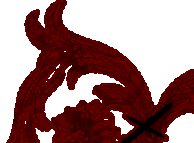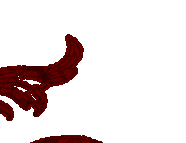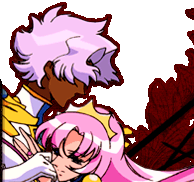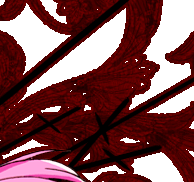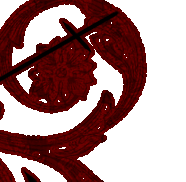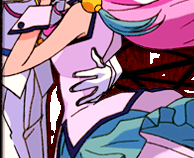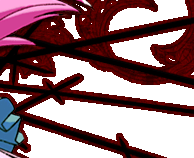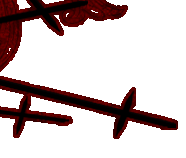

This essay is going to go some pretty bad places, places I’ve personally had to confront. I just want to tell you up front that if you can’t handle discussions of emotional, physical, and sexual abuse, do not read this essay, because that’s what this is all about. As well, this essay does not assume that Anthy was an innocent who was taken advantage of by Akio, for reasons that will be explained.
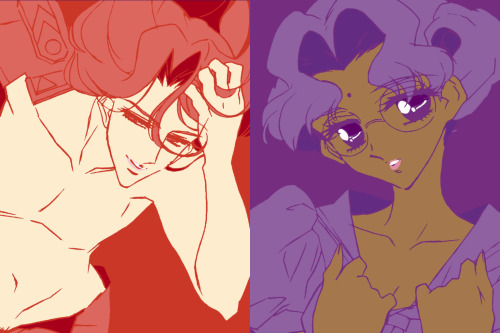
 Very few people note the relationship Touga and Anthy have in the television series, and for good reason. It’s a non-relationship. The few times we see them alone together they never talk about anything important or personal, and sometimes ignore each other completely. The question here is– why? Why would Touga, so ambitious and so grasping, pass up the chance to try to turn Anthy to his ends? Why would Anthy refrain from her passive-aggressive digs and spare Touga her more subtle machinations? It just doesn’t make sense. These are two characters who have been shown in almost every other situation to manipulate everyone around them. So why wouldn’t they try to use and manipulate each other? Very few people note the relationship Touga and Anthy have in the television series, and for good reason. It’s a non-relationship. The few times we see them alone together they never talk about anything important or personal, and sometimes ignore each other completely. The question here is– why? Why would Touga, so ambitious and so grasping, pass up the chance to try to turn Anthy to his ends? Why would Anthy refrain from her passive-aggressive digs and spare Touga her more subtle machinations? It just doesn’t make sense. These are two characters who have been shown in almost every other situation to manipulate everyone around them. So why wouldn’t they try to use and manipulate each other?
I believe the answer lies in something that most people overlook– Touga and Anthy are the same base character expressed differently because of their genders. And further, I believe that Anthy and Touga use themselves and their bodies in the same way, again, expressed differently only because of their genders.
Now, that’s a lot to swallow, and I get that. Touga is ruthless and cunning and manipulative, and he is active, moving schemes forward on his own, toying with the people around him, and always reaching for more and more power. Anthy is also ruthless and cunning and manipulative, yes, but her actions are much smaller, more subtle, and generally seem to forward Akio’s plans rather than her own– if she even has a plan of her own. Despite this difference, the base motivations and character traits, I would argue, are roughly the same.
So let’s dig a little deeper here, and see what we uncover. And you should know by now that it’s not going to be pretty.

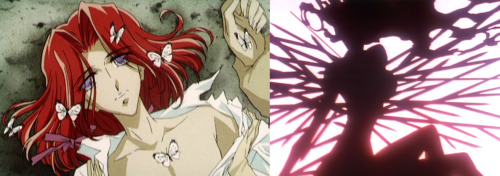 Anthy’s victimhood is an essential part of her character. I don’t mean that just in a literary sense either; Anthy martyred herself for Dios, and since then she has been in constant pain. The Swords pierce her, whether visible or not, and on top of that she has to deal with Akio’s schemes, which do emotional and sometimes physical damage to her. She never resists these things. As the Rose Bride, she passively accepts whatever is handed to her, whether that be Utena’s kindness and encouragement or Saionji’s slaps. In fact, she expresses very little emotion towards either of these things; her reaction to Utena’s encouragement to make friends is just as weak and limp as her reaction to Saionji’s slap. She presents herself as utterly at the mercy of others, and the few times we get a glimpse of her internal dialogue, she does not show any hint of rebellion against her role.
Psychologically speaking, long-term victimhood is quite different from short-term victimhood. Both are damaging, of course, but long-term victimization, such as abusive parents or romantic partners, creates a situation where the victim must adapt to their circumstances and find a way to live with the victimization. This results in a personality that is more comfortable with abuse than not; a victim can grow so accustomed to the abuse that they miss it when it’s gone, and feel uncomfortable in non-abusive situations. For instance, a person who has been in a long romantic relationship with an abuser, once out of that relationship, can wish their abuser was with them and feel like something is missing in non-abusive relationships. It is even possible for the victim to unconsciously (or even consciously) attempt to create their abusive circumstances again– in the case of our person in an abusive relationship, they may be attracted to people with abusive tendencies, or they may try to coerce or convince their non-abusive partner to become abusive with them. This is, unfortunately, a very easy progression to follow. As human beings, we seek out situations we feel at home in, and in this case our victim has been abused so long that they see abuse as being an essential part of the relationship, and may not know how to separate them.
Anthy is, of course, affected by this mindset. She has been with Akio for years, perhaps hundreds of years, taking the Swords on his behalf and being a part of his schemes. Anthy is accustomed to her victimhood and comfortable with it; if she was not, it would have been an easy decision for her to leave him, which would have made the television series about one episode long. The entire television series is about how hard it is for Anthy to leave her abuser.
What is not as noticeable is that Touga is also accustomed to victimhood. For now, we’ll set aside the statements made by Enokido about his past and address them later; at the moment, I’m speaking strictly of information contained within the television series.
Akio victimizes Touga. This should not be in question. Touga is a seventeen year old boy, so legally in Japan, he cannot consent. That’s a weak argument, however; it means nothing in a psychological sense. Consider the state of mind of a seventeen year old boy when he meets an older man with all the evidence of success and privilege. If you watch Touga’s actions rather than his words, you find that while he pretends indifference, he is definitely affected by Akio’s show of status. He calls Akio to tell him about the plans he’s put in place, he shows off his successes, he puts himself in close contact with this older man– and with everyone else, he’s distant and manipulative at best. How he acts around Akio is very telling of a boy his age trying to impress an older man, even if Touga himself would deny it.
Akio uses this hold he has over Touga to manipulate him, to seduce him, and eventually, to hurt him. This alone is extremely troubling. Whether or not Touga appears to consent to this situation is immaterial; he’s been manipulated to do so, and he is just as much Akio’s victim as Anthy is.
Now consider Touga’s behavior with others. With his closest “friend”, he is distant and mocking. With his sister, he is warm enough to keep her coming back to him for approval, but he removes that warmth whenever she displeases him, or if it suits him to do so. There are feeble attempts made to guide her every once in a while, but on the whole he does not display genuine care for her. Most importantly, with his numerous girlfriends, he gives them enough affection and attention that they fall in love with him, but never any real warmth. He easily declares his true affection on the phone with one girl, while he has another in his arms that very moment.
These are actually the hallmarks of someone so emotionally damaged that they cannot express genuine care or affection, and cannot imagine receiving the same. Touga cannot bear to have his only friend leave him, so he keeps Saionji on a short leash, mocking him and his achievements to make sure that Saionji is angry enough to come back to Touga, to prove that he’s a worthwhile person, and maybe break through Touga’s distant facade. Nanami too is on a short leash– she adores him, and he feeds that with his warmth. When he cuts her off with his disapproval, she will try anything to get that warmth back. Touga makes both of them try to gain his approval, and it works to keep them close without letting them near him emotionally.
Touga’s girlfriends are a separate case. His strategy with them resembles the one he uses with Nanami, but for different ends. Touga does not care if any one of the girls drifts away from him. What he is using them for is disposable affection factories; he puts in a little bit of admiration and professes to care for them, and in return he receives their adoration, proof of their love– like dinners cooked especially for him, or waiting all night to see him– and their competition with each other to be his favorite, the one that can sit and listen to him tell another woman he loves her and smirk with him because she knows it’s not true. These women fulfill Touga’s need for affection. You or I, when feeling down, might go to a friend and ask for a hug; Touga is so emotionally crippled that if he’s feeling down, he goes to one of his girlfriends and lets her lavish him with affection until he gets tired of it, then leaves– like turning off a faucet. Nothing real is ever exchanged. In any of Touga’s interactions with the people he’s closest to, he never betrays any of his real feelings. That speaks of a severe emotional disturbance in Touga’s past. He acts as if some past event has crippled his ability to express and feel affection. His self-serving, abusive behaviors are actually evidence of the same long-term victimization that Anthy faces.
According to the series as it stands, the nature of the past event is up for debate. The movie, however, goes into it– and Enokido himself had intended to include this information in the series.
“Although the TV series touched upon Touga’s younger days, the film goes into more details – the wound of Touga that was never directly depicted. In his younger days, Touga was a normal kid who enjoyed happy times with his friend Saionji Kyouichi and his younger sister Nanami. However, he came to know his unfortunate fate from the time he was ordered by his parents to wear his hair long. His parents sold him to the Kiryuu family. Although he was an adopted son on the surface, the instinctive Touga knew what that meant. And in order to protect his younger sister, he accepted his lot. Being sold. We did not go into depicting what Touga’s parents obtained by going as far as selling their son. We would like you to think of it as a kind of metaphor.
And Touga accepted in silence the sexual abuse from his new parents. His personality changed while he made a magnanimous show of enjoying the abuses in order to prevent his personality from splitting. The change took place in a spot so deep in his mind, that even those closest to him did not notice. Saionji and Nanami never noticed out of their innocence. And Touga never told his secret to anyone. It is said that a human being gains whatever he lost in exchange. So what did Touga gain in exchange at that point in time? It was the sense of alienation from being abused every night and seeing his innocent friend and sister during the day. The alienated self.
And it is out of this awareness of alienation that you come to obtain a higher human and sexual self-awareness. In the TV series, Saionji always felt that he was one step behind Touga. Although the two are more or less equal in terms of ability, what Saionji lacked was that sense of alienation.” – Enokido
This merely reinforces what we can already deduce from Touga’s behavior. Personalities like his don’t show up out of nowhere– something had to make him, to shape him, to mold his behavior into creating the rigid balance between emotional distance on his part and desperate want of the part of everyone surrounding him. Even if this information is not taken into account, Touga still exhibits all the behaviors that would result from some horrible breach of trust and widening gulf of alienation from his closest friends.

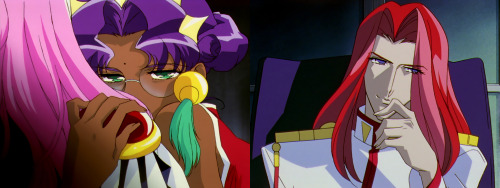 One problem with long-term victimhood, from a detached observer’s viewpoint, is that it can be extremely hard to sympathize with a long-term victim without sanitizing their behavior. Most people feel uncomfortable when asked to sympathize with someone who has been abusive, and the fact is that long-term victims can more easily become abusers. If you live with abuse, and all you know is abuse, you are more likely to abuse simply because you have no other framework with which to relate to the world. It is a very uncomfortable fact, and I personally have had to confront it in my own behavior as well as seen it in the behavior of others. But it is a natural evolution of personal behavior when trapped in an abusive relationship. When in pain, the instinct is for fight or flight; in an abusive relationship, there is no such thing as flight. The only options are to fight or submit. Fighting causes retaliation, and submission breeds resentment and despair. The abuser’s goal is submission, and in a long-term victimization, they have achieved it. The victim is left with resentment and despair as their only real options.
So what do you do? Do you give up and let them do what they like, be their “doll with no heart”? Or do you fight back in little ways, lashing out at them and the tools of their abuse?
If you picked the second, you are one step closer to being an abuser. The last little step to take is just this: act on your resentment with no intent to defend yourself or leave. Act on it only to cause pain or gratify yourself.
That’s all it takes to be abusive. It’s unfortunate, it’s uncomfortable, and it’s very, very human.
Condemnation of this behavior is pointless. The common thread with abusers is considering their own desires to be more important than the needs of the people around them. It is ridiculous to expect a long-term victim to consider the needs of others before their own desires, when those desires are mainly to stop being hurt by someone they care about. If a long-term victim steps into abusive behavior, they bear the responsibility for their actions, but they should not be blamed. It’s beyond most people’s willpower and mental fortitude to live in a hurtful situation that they do not control and never to lash out in pain, anger, and resentment.
There is no doubt whatsoever that Touga is an abuser. The actions that show the evidence of his victimization are all abusive actions; he considers his own desires to be more important than the people around him. His desire for reaffirmation of closeness comes at the expense of Saionji’s pride and self-worth, and Nanami’s world-shaking loss and pain when he denies her his affection and his connection to her. In a way, when he is abusive toward them, it is evidence of their importance to him. The idea of an abuser as someone that cannot care about their victim is utterly false. Abusers absolutely can care about their victims, sometimes very deeply. It’s just that nothing is more important to them than what they want. In Touga’s case, his abuse stems from the desire and inability to be close to his victims. He needs them. He wants them around. He wants them focused on him to the exclusion of all else. He treats them the way he does because it’s the best way to make certain they will never, ever leave him. For all his show of unconcern, he is deeply invested in their relationship with him. He will never willingly let go, even if they want him to. That is what makes him an abuser.
Anthy is also an abuser. In her case, it is quite a bit more subtle; no doubt she learned long ago that overt displays of resentment, anger, or aggression would be punished– if not by Akio, by the world. Her behavior towards Akio, when taken out of context of the rest of her behavior, seems excusable. After all, she’s retaliating against someone who abuses her. But when taken in the context provided, it becomes a very different story. Anthy’s hurtful tendencies are in evidence from the very first episode, when she needles Saionji for losing his duel with Utena, through the Black Rose Saga, where as Mamiya she helps to orchestrate the duels and torment Utena, Mikage, and the rest of the duellists, and finally in the last episodes, where she literally stabs the one person who truly loves her in the back to preserve her relationship with Akio.
To deny that Anthy willingly did these things is to remove her agency and sanitize her, making her safe for consumption. It is safe to treat her as a victim and sympathize with her only so long as most of the evidence of her pain is removed from the equation entirely. This view may simplify things for the audience, but it removes all complexity from the character and reflects the very harmful tendency society has to only acknowledge victims as saints and deny support and assistance to victims that cannot be sanitized enough to suit them. Anthy does not deserve to be forced into the sanitized role given to her. In a sense, that’s exactly what was done when she became the Rose Bride; she sanitized herself and made herself a perfect victim in the eyes of others, so they wouldn’t suspect that she was working with Akio to manipulate the Duelists. Consider the differences between the Anthy we see in the first episode and the Anthy we see at the end of Episode 36; one of them is Anthy in her sanitized role, and the other is Anthy herself, dangerous and messed up and spitefully letting Utena see that Akio belongs to Anthy, first and foremost. 
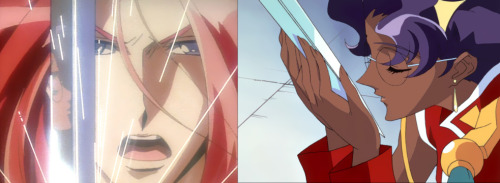 With what we have seen so far, we can ascertain that Touga and Anthy are, in essence, in the same position. Both taken advantage of by someone more powerful than they are, both lashing out at the nearest targets they can reach, both manipulating situations to suit themselves. How it is presented, however, is a very different story, and one that tends to mask the similarity of these two characters… but ultimately serves the same purpose for both of them.
Anthy is presented as passive and helpless. Anthy presents herself as passive and helpless. We’ve seen the series; we know this isn’t true. Anthy is dangerous and powerful, when she feels she can be. But her presentation is wrapped up in what we consider to be the Feminine; despite that we know she is sleeping with her brother, she presents herself as chaste. Despite that we know she can do things like switch bodies with Utena, or turn herself into Mamiya, she presents herself as powerless. Despite stabbing Utena in the back, she presents herself as weak. These are all qualities that we perceive to be feminine: chastity, powerlessness, weakness, passivity. It’s camouflage. This is Anthy’s way of making herself less of a target. By adopting these qualities, she presents herself as a valuable object to be protected, and that gives her a measure of security as it’s built in to the Duelists to want to own her. The object that they fight over isn’t real. Her real self is never touched by the duels… at least until Utena comes along. This is Anthy’s way of keeping her mental distance from the Duels and the Duelists. The appealing feminine object that they fight over has nothing to do with her self. Her self is safe, protected by the feminine shield.
Touga, on the other hand, presents himself as very masculine. Where Anthy is chaste, he’s… well… “virile.” He makes great shows of his power over the other Duelists; they dance to his tune as much as they do Akio’s, in the first arc, and even later on Touga is still the one calling the shots when it comes to getting most of the Duelists into Akio’s car. He positions himself to look like he has even more power than he actually does. Physically, of course, we see evidence of his strength; he spars with Saionji, and he fights Utena to enough of a standstill that he can manipulate her into losing. And he is active. He grasps for power, he inserts himself where he has no real business– Miki’s situation, for instance– and he constantly seeks out ways to expand his reach within the school. All of this is very masculine, and all of it is as much camouflage for him as the Feminine is for Anthy. Touga cannot allow himself to look weak or powerless, because that would make him a target. And he is, after all, just a seventeen year old boy with no one he trusts enough to confide in and a long history of abuse. It should go without saying that he’s as vulnerable as anyone. His entire persona is built around power and the perception of power, and it’s all a distraction from his own weakness. We know this, too, because of his reaction to his defeat by Utena. He crumples into almost nothing, all his scheming gone. His defeat was a removal of the perception of masculine power, and his withdrawal was the last measure he could take to keep his own self from being vulnerable to others.
The gender roles that the two of them adopt are very much mirrors of each other. They’re complementary, meant to fit together. No such connection takes place, however; when Anthy is Touga’s Rose Bride, they ignore each other completely. And with that in mind, we’ll head into the last part of this essay.

Sex is something that is very present in both Touga and Anthy’s presentation. Touga’s is far more overt– come on, you know he’s getting laid. Spending all those nights with his clamoring horde of admirers and not having sex would be far more surprising. By contrast, Anthy’s sexuality is very much implicit and inherent in her role as the Rose Bride. Much is made of the Rose Bride having to do whatever the Engaged wants, and enough suggestive hints are dropped to make you aware that yes, this probably does include sexual favors.
Sex is also present in their hidden lives– their liaisons with Akio. Those serve an important purpose for both Touga and Anthy; as their abuser, and the reason for their vulnerability, he is already closer to their hidden selves than anyone else. In essence, sex with him is an opportunity not to hold up the mask. Touga can let go of his need to dominate and control his interactions. Anthy can let go of her need to repress herself. In their relationships with Akio is a perverse kind of freedom, where they can both express themselves more fully.
It is also, however, a bargain. In fact, all of sexuality, for both Anthy and Touga, is a bargain. Touga knows very well what effect his attention has on his swarm of followers. Sex, for him, is a way to cash in on their affection without having to engage in intimacy. If he makes his body available to them, they lavish him with attention and the semblance of love, sating his need for companionship without fulfilling it. Anthy’s dangling hints of sexuality ensure the devotion of the Duelists to their cause of owning her, thus reinforcing the walls that keep the real world away from her. Both of them are trading sex for an illusion of safety, and they know it.
The same pattern is in effect with Akio. Anthy has sex with him to reaffirm that she’s still important to him, important enough to be able to hurt him. That importance is her safety in her position above the Duels, closer to him. Touga has sex with Akio to ensure that he still has the ear and attention of the most powerful man in his sphere. That attention is power, and to Touga, power is safety. In essence, they are both using their bodies to ensure their own safety; sex, for them, is something they use to protect themselves.
Commodification of the body is common in long-term abusive sexual relationships. To both Touga and Anthy, their bodies are something they can use, a tool like intelligence or strength, an asset that can sway events in their favor. It takes a certain amount of detachment from yourself to cold-bloodedly trade your body for a material benefit. This has surface resemblances to sex work, but because this is within the framework of an abusive relationship, it cannot be considered genuine consent or willingness and so is not necessarily comparable. It’s a survival strategy. If sex is what will get them freedom, protection, advantages, and safety, all within this abusive framework, it would be ridiculous to refuse. And so they don’t. They make the decision, over and over, to reaffirm their importance, their power, their safety, by trading sexual access to their bodies. And over time this creates its own detachment and makes it easier to do things like, say, throw yourself in front of a blade just to further a scheme, or stand the pain of a million swords. It’s just a body. Just a tool. It’s not you that you’re giving away. It’s not you that you’re hurting. It’s just meat that you haul around and that other people seem to want.
This is the trap that Akio has them both caught in. By commodifying themselves, Anthy and Touga both find the strength to withstand things that would crush others. By using their bodies as tools, they gain advantages, power, and certain values of freedom. But none of that costs Akio anything at all. All the detachment and pain and alienation that Anthy and Touga feel just means more orgasms for him. From his point of view, this is incredibly well-thought-out, an excellent setup he has going for himself. They pay their price for advantages that cost him nothing to give.
In the end, there are many surface reasons that Anthy and Touga might ignore each other. Maybe they understand the bargains the other is making and feel the same contempt they have for themselves. Maybe they have no idea and don’t care to dig further, out of some subconscious idea that they may not like what they see. Maybe it’s just a kind of respect. An understanding that they’re in the same position, and any attempt to meddle with each other only puts them both at risk to each other as well as everyone else. Or maybe they know that they’re similar enough that the only possible outcome of closer contact is pain, for both of them.
The real reason, however, is that on a subconscious level they both understand that they have nothing to gain from each other. They can’t satisfy themselves by lashing out at each other– it would either fail or destabilize them in their positions. They can’t band together to defeat Akio. That’s unthinkable. They realize they can’t trust each other, and neither of them want to leave Ohtori yet, so escape is out of the question. They only thing they can do is help each other further their schemes– and they do, coldly, carefully, and minimally, as they know that close contact would be damaging. Because of all this, they exempt each other from their scheming and striving. In the case of these two abused, abusive, compulsively manipulative people, that in itself is a mark that sets them apart from anyone else in each others’ eyes, a recognition of themselves in the other.
 |

